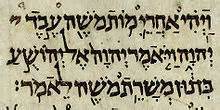"The Hand of the LORD My God Was on Me" -- Ezra 7:1-10
 Tuesday, October 4, 2016 at 10:28AM
Tuesday, October 4, 2016 at 10:28AM  The Seventh in a Series of Sermons on Ezra-Nehemiah
The Seventh in a Series of Sermons on Ezra-Nehemiah
Enter Ezra–the key figure in the next four chapters of the book which bears his name. The year is 458 B.C. The second temple was completed some sixty years previously, and sacrifices were being offered since that time according to the law of Moses. A priest in the genealogical line of Aaron, and also described as a skilled “scribe,” Ezra is among the first of a long line of Jewish biblical scholars who are devoted students of God’s law–men who later came to be known as “scribes” during the days of Jesus, four hundred years later. Some have described Ezra as the “secretary of state for Jewish affairs,” since Ezra was commissioned by the Persian king Artaxerxes to leave Babylon, travel to Jerusalem, and report back to the king about the current state of affairs regarding the Jews and their progress in rebuilding their capital city and its defenses (walls). Upon his arrival in Jerusalem, Ezra began a series of reforms including a renewed devotion to the law of God, renewed focus upon prayer and fasting, as well as insisting that the Israelites end the practice of intermarrying with the pagans around them. With his arrival in Jerusalem, the scene in the Book of Ezra shifts from its focus upon the temple to a focus upon the law of God as the people of God return to the pattern so well established throughout Israel’s history–times of revival (in this case the Jews returning to the land and the rebuilding of the temple), followed by times of unbelief and apostasy, as many Jews seek to make peace with their pagan neighbors, many more intermarry with them, and some even adopt their pagan practices.
We are the midst of a series on the books of Ezra and Nehemiah, and this morning we come to Ezra 7. In the previous chapters, we have considered the author’s account of that period of Israel’s history in which the Jews are back in their land, living as one people, with a rebuilt temple in Jerusalem, and facing many of the trials and tribulations which the people of God have struggled from the time they first entered Canaan back in the days of the conquest. How do the people of God maintain their faith in YHWH and their loyalty to him, when the pagans all around them seek to entice them away from worshiping and serving the true and living God? As a man who can trace his ancestry back to Aaron (Israel’s first high priest), Ezra is well qualified for his role as a reformer of sorts, seeking to renew his people’s love for YHWH and their commitment to his covenant–specifically, the law of Moses. Israel many be back in the land of Canaan, but they live under Persian control, and the leadership of the nation naturally passes from the first generation of post-exile leaders, Zerubbabel and Jeshau (Joshua), to an increased role for the high priest, who now leads the people in both religious and political matters.
Since the days when Israel first returned to the land because of the decree of Cyrus in 538 BC, a whole series of Persians kings have come and gone. Cyrus’ successor Darius (who was featured prominently in earlier chapters of Ezra) died in 486 BC. Darius was replaced by his son Xerxes, who ruled over the vast Persian empire from 485 until his death in 465 at the hand of one of his own bodyguards. Xerxes’ son, Artaxerxes–who is king in the days of Ezra–ruled until he died 424 BC. Given the upheaval and intrigue within the Persian royal dynasty, it is important for Ezra to remind us six times in chapters 7-8 that “the hand of God” orchestrated all of these things for the benefit and preservation of his people. The Persian kings come and go, but God’s providential purposes remain the same.
To read the rest of this sermon, Click Here


Reader Comments